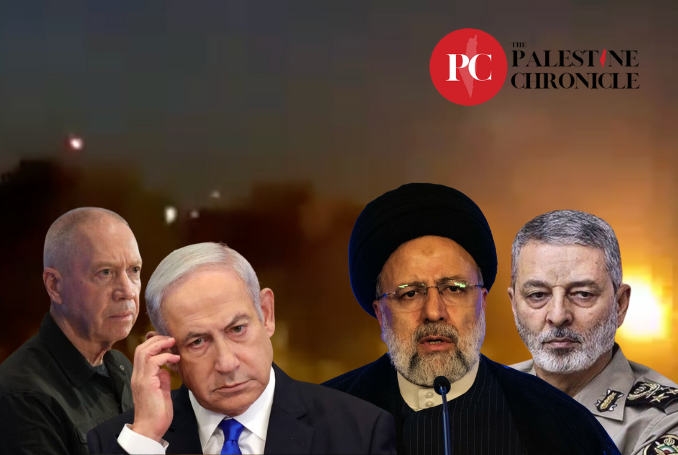
Explosions were heard over an Iranian city overnight on Friday in an alleged Israeli attack. Tehran, however, played down the incident and said it has no plans to retaliate.
Iranian media and officials said that a limited number of explosions were heard, as a result of Iran’s air defenses hitting three small drones over the city of Isfahan.
Iranian officials referred to the incident as an attack by ‘infiltrators’, rather than by Israel. Reuters news agency quoted an Iranian official as saying that “the foreign source of the incident has not been confirmed.”
“We have not received any external attack, and the discussion leans more towards infiltration than attack,” the official reportedly added.
CHANNEL 12: Security estimates that the attack on Iran has ended.
FOLLOW OUR LIVE BLOG https://t.co/ORhdjwoJaW https://t.co/zUDs9SzrV4
— The Palestine Chronicle (@PalestineChron) April 19, 2024
Did Israel attack Iran?
The British newspaper The Guardian reported on Friday that “US officials have confirmed that Israel has carried out military operations against Iran.”
The Guardian cited the officials as saying that Israel “warned the Biden administration earlier on Thursday that a strike was coming in the next 24 to 48 hours.”
CNN confirmed that the US “was given advance notification Thursday of an intended Israeli strike in the coming days,” but reported that Washington “did not endorse the response”.
The Israeli army told CNN “it was unable to provide a comment on Friday, when asked by CNN about reports of explosions in Iran.”
Israeli media reported that the attack on Iran has ended, but Israel maintains high alert.
Iranian Ground Forces Commander, General Kayuarth Heydary, said that small drones attacked Iranian airspace in the city of Isfahan, but air defenses were activated and successfully responded.
As China and other countries urge an immediate deescalation, far-right Israeli Minister… pic.twitter.com/gydV1QK0kV
— The Palestine Chronicle (@PalestineChron) April 19, 2024
What does Iran say?
Iranian state media has reported that air defense systems were put on alert following reports of explosions near a significant airbase adjacent to the city of Isfahan.
Iranian state news agency IRNA quoted Maj. Gen. Abdolrahim Mousavi, the commander-in-chief of Iran’s army, as saying that the explosions in the sky were related to anti-aircraft systems shooting at a suspicious object, which did not cause any damage.
CNN quoted other Iranian officials as saying that air defenses intercepted three small drones and there were no reports of a missile attack.
Several Iranian news agencies confirmed that “sites associated with Iran’s nuclear program were secure and the attack appeared to be limited in scope,” according to CNN.
A senior Iranian official told Reuters on Friday that Iran has no plan for immediate retaliation against Israel.
“The foreign source of the incident has not been confirmed. We have not received any external attack, and the discussion leans more towards infiltration than attack,” the Iranian official said on condition of anonymity.
IRANIAN STATE TV: Sounds of explosions in several areas were caused by air defenses repelling some small drones.
CNN (Citing US official): We understood from Israeli officials that they would not target any Iranian nuclear facilities.
FARS NEWS AGENCY: Anti-defensive… pic.twitter.com/DNwDU3uatC
— The Palestine Chronicle (@PalestineChron) April 19, 2024
Did the attack threaten Iran’s nuclear facilities?
Isfahan hosts facilities linked to Iran’s nuclear program, notably the subterranean Natanz enrichment site.
Iranian state television assured that all sites in the vicinity were “completely secure,” a statement corroborated by the International Atomic Energy Agency (IAEA), confirming no harm to nuclear installations.
Reactions
Several countries and entities called for restraint, warning against escalating tensions in the region.
China
The Chinese foreign ministry spokesperson said Beijing opposes any action that could escalate tension in the Middle East.
G7 Foreign Ministers:
The G7 foreign ministers said in a statement that they “urge all parties to work to prevent further escalation”.
The statement added that more efforts must be made to alleviate the devastating humanitarian situation in Gaza, while renewing its opposition to Israel’s military invasion of Rafah.
CHINESE FM: We oppose any behavior that would further escalate tensions in the Middle East.
FOLLOW OUR LIVE BLOG https://t.co/ORhdjwoJaW pic.twitter.com/0B7Nm57r8o
— The Palestine Chronicle (@PalestineChron) April 19, 2024
Jordan
Jordanian Foreign Minister Ayman Safadi warned against “the danger of regional escalation.”
“We condemn all actions that threaten dragging the region into war. Israeli-Iranian retaliations must end.”
Safadi added that “the inhumane war on Gaza must end now. The focus of the world must remain on ending the catastrophic aggression on Gaza”.
Russia
Russian Foreign Minister Sergey Lavrov said that Moscow made it clear to Israel that Iran “does not want escalation.”
In an interview with Russian radio stations, Lavrov said that “There have been telephone contacts between the leadership of Russia and Iran, our representatives and the Israelis.”
“We made it very clear in these conversations, we told the Israelis that Iran does not want escalation,” Lavrov said in an interview with Russian radio stations.
(The Palestine Chronicle)




